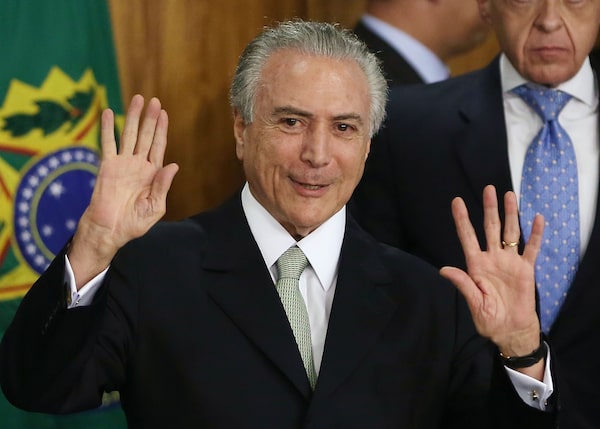
Former Brazilian President Michel Temer, shown waving during a ceremony at the Planalto presidential palace, has been arrested in connection with the ongoing Operation Car Wash corruption investigation.Mario Tama/Getty Images
Brazilian federal police arrested former president Michel Temer on Thursday morning at his home in Sao Paulo, less than three months after he left office, in connection with corruption allegations as part of the sweeping Lava Jato investigation.
Moreira Franco, a top cabinet minister in the Temer administration and powerful former governor of the state of Rio de Janeiro, was also arrested; warrants have been issued for a host of other Temer advisers and aides, and for his daughter.
The arrest makes Mr. Temer, 78, the second Brazilian president jailed in connection with Lava Jato – and has major implications for the country’s fight against corruption, and its long-simmering political crisis.
Lava Jato, or car wash in English, is a sprawling investigation into a system of kickbacks and bribes to politicians that began in 2014 with the state energy company Petrobras, and has seen politicians from all parties convicted of graft.
Mr. Temer has faced a raft of corruption, racketeering and obstruction of justice charges – Judge Marcelo Fretas, in the document ordering the arrest, called him “the head of a criminal organization.” Mr. Temer had previously avoided charges by invoking the protections of his office, and doling out favours to lawmakers to avoid impeachment that would have stripped him of immunity. He lost those protections when he left office on Jan. 1.
Former president Luiz Inacio Lula da Silva is in jail, serving 25 years on graft convictions. When he was sent to prison a year ago, while Mr. Temer remained at liberty, many Brazilians questioned whether the corruption probe was actually a partisan effort in which the judiciary targeted leftist parties.
“This arrest is a very powerful statement that Lava Jato is not just about the Workers’ Party or Lula,” said Mauricio Santoro, a political scientist at the State University of Rio de Janeiro.
But, he added, it’s also an important demonstration of power by Sergio Moro, the judge who presided over Lava Jato until he was named justice minister in the new government of Jair Bolsonaro. “He’s showing that he isn’t tamed because he is in government now, and that Lava Jato is still strong,” Prof. Santoro said.
Appointing Mr. Moro as his justice minister was one of Mr. Bolsonaro’s most popular moves, but the crusading former judge has faced stiff opposition in Brasilia. His anti-corruption measures have been stalled in Congress by a supposed Bolsonaro ally, Rodrigo Maia, the Speaker of the lower house – who happens to be Mr. Franco’s son-in-law.
In 2017, Mr. Temer was charged with corruption and obstruction of justice. But under Brazilian law, a sitting president can only be tried by the Supreme Court; Mr. Temer persuaded allies in Congress to freeze the case and keep it from reaching that bench.
“This is a barbarity,” he told a reporter who reached him by cellphone as he was being detained, according to Folha de Sao Paulo.
Mr. Temer, a career politician in the Brazilian Democratic Movement party, was elected vice-president in 2014 on a ticket with then-president Dilma Rousseff. Not long after the election, he began to work against her, allying himself with senior officials angry that she would not do more to block the corruption probe that had reached the highest levels of government. He helped to orchestrate Ms. Rousseff’s impeachment in 2016, and was sworn in as president upon her ouster.
Many Brazilians blamed Ms. Rousseff for the country’s severe recession, but few had a better opinion of Mr. Temer. His popularity rating consistently hovered around three per cent, and he spent most of his political capital trying to shut down the criminal investigations of his conduct.
“The case against Temer is very strong – we know a lot about the way he has been stealing public money for 20 years or more,” Prof. Santoro said. “But it’s also very significant to see Moreira Franco arrested: He is part of the old, powerful Rio political elite who have acted as if they were above the law.”
Mr. Temer’s arrest is good news for Mr. Bolsonaro, who was elected late last year in large part due to popular frustration with corruption and the political class. The arrest comes on Mr. Bolsonaro’s birthday and offers the gift of distraction from the new President’s fights with allies in Congress and the scandals that have already engulfed his own family. His son Flavio, a Rio lawmaker, is being investigated for corruption, and all three of his sons are under scrutiny for ties to shadowy militia forces of ex-law-enforcement officers that control much of the city of Rio.